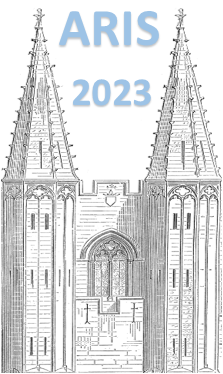Sophia Florence Dellmann
(Goethe University Frankfurt)
For the first time, the proton capture reaction for a stored radioactive isotope has been directly measured. This measurement became possible by combining two unique facilities at GSI (Helmholtz Centre for Heavy Ion Research),
the fragment separator (FRS) and the experimental storage ring (ESR). The combination of sharp ion energy, ultra-thin internal gas target, and the ability to adjust the energy of the beam in the ring enables precise, energy-differentiated measurements of the (p,$\gamma$)-cross-sections. This provides a sensitive method for measuring (p,$\gamma$) and (p,n) reactions relevant for nucleosynthesis processes in supernovae, which are among the most violent explosions in the universe and are not yet well understood.
The cross section of the $^{118}$Te(p,$\gamma$) reaction was measured at energies of astrophysical interest. The heavy ions were stored with energies of 6~MeV/u and 7~MeV/u and interacted with a hydrogen gas-jet target providing the protons. A Double-sided silicon strip detector was used in order to detect the produced $^{119}$I ions. The radiative electron capture process occurring in collisions of the fully stripped $^{118}$Te ions with electrons from the hydrogen target were used as a luminosity monitor.
These measurements follow a proof-of-principle experiment which was performed in 2016 to validate the method on the stable isotope $^{124}$Xe [1].
An overview of the experimental method and preliminary results from the ongoing analysis will be presented.
[1] J. Glorius et al., Phys. Rev. Lett. 122, 092701 (2019)
Sophia Florence Dellmann
(Goethe University Frankfurt)
Alexandre Gumberidze
(GSI Helmholtzzentrum f\"ur Schwerionenforschung Darmstadt, Germany)
Andrey Surzhykov
(Physikalisch Technische Bundesanstalt Braunschweig, Germany)
Bastian Löher
(GSI Helmholtzzentrum f\"ur Schwerionenforschung Darmstadt, Germany)
Beatriz Jurado
(IN2P3/CENBG)
Benjamin Brückner
(Goethe University Frankfurt, Germany)
Bernd Alfred Lorenz
(GSI Helmholtzzentrum f\"ur Schwerionenforschung Darmstadt, Germany)
C. Griffin
(TRIUMF)
Carlo Bruno
(University of Edinburgh, United Kingdom)
Christoph Langer
(University of Applied Science Aachen, Germany)
Christoph Scheidenberger
(GSI Helmholtzzentrum für Schwerionenforschung, Darmstadt, Germany; Justus-Liebig-Universität Gießen, Gießen, Germany)
Christophor Kozhuharov
(GSI Helmholtzzentrum f\"ur Schwerionenforschung Darmstadt, Germany)
Claudia Lederer-Woods
(University of Edinburgh, United Kingdom)
Diego Vescovi
(Goethe University Frankfurt, Germany)
Dmytro Dmytriev
(GSI Helmholtzzentrum f\"ur Schwerionenforschung Darmstadt, Germany)
Emma Haettner
(GSI Helmholtzzentrum für Schwerionenforschung, Darmstadt, Germany)
Enis Lorenz
(TU Darmstadt, Germany)
Esther Menz
(GSI Helmholtzzentrum f\"ur Schwerionenforschung Darmstadt, Germany)
Guy Gleckenby
(TRIUMF, Vancouver)
Hans Geissel
(GSI Helmholtzzentrum für Schwerionenforschung, Darmstadt, Germany;Justus-Liebig-Universität Gießen, Gießen, Germany)
Hans T. Tornqvist
(Chalmers University of Technology)
Dr
Helmut Weick
(GSI Darmstadt, Germany)
Iris Dillmann
(TRIUMF, Canada)
Ivan Kulikov
(GSI Helmholtzzentrum f\"ur Schwerionenforschung Darmstadt, Germany)
Jacobus Swartz
(Centre Etudes Nucleaires de Bordeaux Gradignan)
Jan Glorius
(GSI Darmstadt)
Jordan Marsh
(University of Edinburgh, United Kingdom)
Jérôme PIBERNAT
(CENBG)
Kafa Al-Khasawneh
(Goethe University Frankfurt, Germany)
Kathrin Göbel
(GSI Helmholtzzentrum f\"ur Schwerionenforschung Darmstadt, Germany)
Laszlo Varga
(GSI Helmholtzzentrum f\"ur Schwerionenforschung Darmstadt, Germany)
Lukas Bott
(Goethe University Frankfurt, Germany)
Marialuisa Aliotta
(University of Edinburgh, United Kingdom)
Mario Weigand
(Goethe University Frankfurt, Germany)
Markus Steck
(GSI Darmstadt)
Michael Heil
(GSI Helmholtzzentrum f\"ur Schwerionenforschung Darmstadt, Germany)
Michael Lestinsky
(GSI Helmholtzzentrum f\"ur Schwerionenforschung Darmstadt, Germany)
Michele Sguazzin
(CNRS)
Nikolaos Petridis
(GSI Helmholtzzentrum f\"ur Schwerionenforschung Darmstadt, Germany)
Oliver Forstner
(GSI Helmholtzzentrum f\"ur Schwerionenforschung Darmstadt, Germany)
Philip Woods
(University of Edinburgh, United Kingdom)
Philipp Erbacher
(Goethe University Frankfurt, Germany)
Pierre-Michel Hillenbrand
(GSI Helmholtzzentrum f\"ur Schwerionenforschung Darmstadt, Germany)
Ragandeep Singh Sidhu
(GSI Darmstadt, University of Edinburgh)
Regina Heß
(GSI Darmstadt)
Rene Reifarth
(Goethe University Frankfurt)
Robert Grisenti
(GSI Helmholtzzentrum f\"ur Schwerionenforschung Darmstadt, Germany)
Ronald Joseph
(GSI Helmholtzzentrum f\"ur Schwerionenforschung Darmstadt, Germany)
Rui Jiu Chen
(GSI Darmstadt)
Sergey Litvinov
(GSI Darmstadt)
Shahab Sanjari
(GSI Darmstadt, University of Applied Sciences, Aachen)
Siegbert Hagmann
(GSI Helmholtzzentrum f\"ur Schwerionenforschung Darmstadt, Germany)
Takayuki Yamaguchi
(Saitama University)
Thanassis Psaltis
(TU Darmstadt, Germany)
Thomas Stöhlker
(GSI Darmstadt, Helmholtz-Institut Jena)
Timo Dickel
(GSI Helmholtzzentrum für Schwerionenforschung, Darmstadt, Germany;Justus-Liebig-Universität Gießen, Gießen, Germany)
Tino Morgenroth
(GSI Helmholtzzentrum f\"ur Schwerionenforschung Darmstadt, Germany)
Tom Davinson
(U. Edimburgh)
Ulrich Popp
(GSI Helmholtzzentrum f\"ur Schwerionenforschung Darmstadt, Germany)
Uwe Spillmann
(GSI Darmstadt)
Yuanming Xing
(GSI Helmholtzzentrum f\"ur Schwerionenforschung Darmstadt, Germany)
Yury Litvinov
(GSI Darmstadt)

